Have you ever seen someone’s job title and wondered, how did they get that job? Or, how did they even know jobs like that existed?
Some career paths are straightforward and well-publicized. If you want to be a doctor/lawyer/consultant, you follow the steps, get the right internships and degrees, and there you are. And if you don’t want to do those things? This might seem like your only option:

Your dream career doesn’t have to be a giant question mark. You can apply a simple structured process to learn about, then land, the kind of job that won’t bore people when you talk about your work at parties—a job you’ll find genuinely fulfilling and will also pay your bills! All it takes is a little scrappiness and a love of Trello.
Start Your Dream Job Search In 5 Steps
This is the exact process I used to figure out where I wanted to take my career, successfully pitch a job at NIKE that didn’t even exist, and then use that experience to transition from my nonprofit background to a job in tech (I’m currently at Dropbox).
- Collect data to understand the market.
- Look for patterns to refine your posting prowess.
- Upgrade your resume and make it worth a second look.
- Get the experience now (even if you don’t have the job).
- Land that dream job.
Take as much inspiration as you’d like from screenshots of my actual Trello boards, as well as real emails I sent with templates you can use. The job of your dreams is just a few steps away!
1) Collect Data
The purpose of this step is source as much data as you can about available jobs that sound interesting and to get a macro view of the job market. It is not to find the specific job listings to which you want to apply. Most people skip this step, which is a mistake! You might pass up a career that you could love simply because you have preconceived ideas or inherent biases about what different jobs entail, what you are qualified to do, or how to talk about your experience.

Start by making a Trello list called “Company List.” Create cards for companies and organizations you find interesting or are curious about. Come up with as many as you can— at least 30. If you’re having trouble, here are some resources:
- The Muse company profiles
- Fortune’s 100 Best Companies to Work For
- Bloomberg Businessweek’s 50 Companies to Watch
- Crain’s Best Places to Work
- 65 Companies with Corporate Innovation Labs
- Fast Company’s Most Innovative Companies
- Angel List job collections
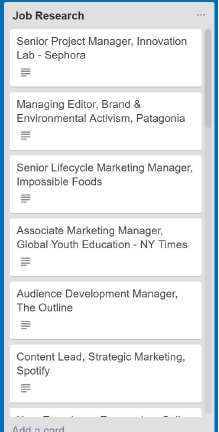
Now, make another list called “Job Research.” Look up the open jobs at the companies you’ve listed in the last step. Any time you see a job that looks even remotely interesting, make a card for it and add it to the list.
Copy the entire job description and paste it on the card with a link to the listing. It doesn’t matter if you’re qualified, or where they’re located, or if the open position is too senior or junior, or even if they get filled before you finish the process. You’re going to aim to save 40+ job descriptions by the end of this step.
Here’s a look at the completed card at this initial job search stage:

If you’ve exhausted the listings from your target companies, you can also scroll through curated job boards and find more jobs there. Here are some I like:
Next, go through your Job Research list and start moving the cards up and down so that the jobs that sound most interesting to you are closer to the top and the jobs that sound least interesting to you are closer to the bottom.
2) Look For Posting Patterns
Now comes the fun part! Look through the cards and try to find patterns among the companies and positions that appeal most to you. Here are some frameworks for evaluating them:
- Do the jobs cluster in certain industries?
- Are there certain keywords that pop up in a lot of the job descriptions?
- Are the companies at a certain growth stage or size?
- Do they tend to have similar values or reputations?
- Do the jobs tend to be more or less cross-functional?
- Do they focus more on strategy or implementation? Or both?
- What skills do they require?
Make some new lists in Trello and use them as different buckets to sort the job cards. You can try a few different categories before you get it right. For example, I first sorted mine by industry, but that didn’t feel quite right to me. It left some jobs out, and didn’t capture what I found interesting about certain jobs.

I re-read the job descriptions and the required qualifications. I made more function-specific buckets. I expanded some lists and combined some lists. I deleted some jobs that seemed less interesting or relevant by that time. I moved the lists around in rough order of what I found most interesting to less appealing. Here’s what I settled on:
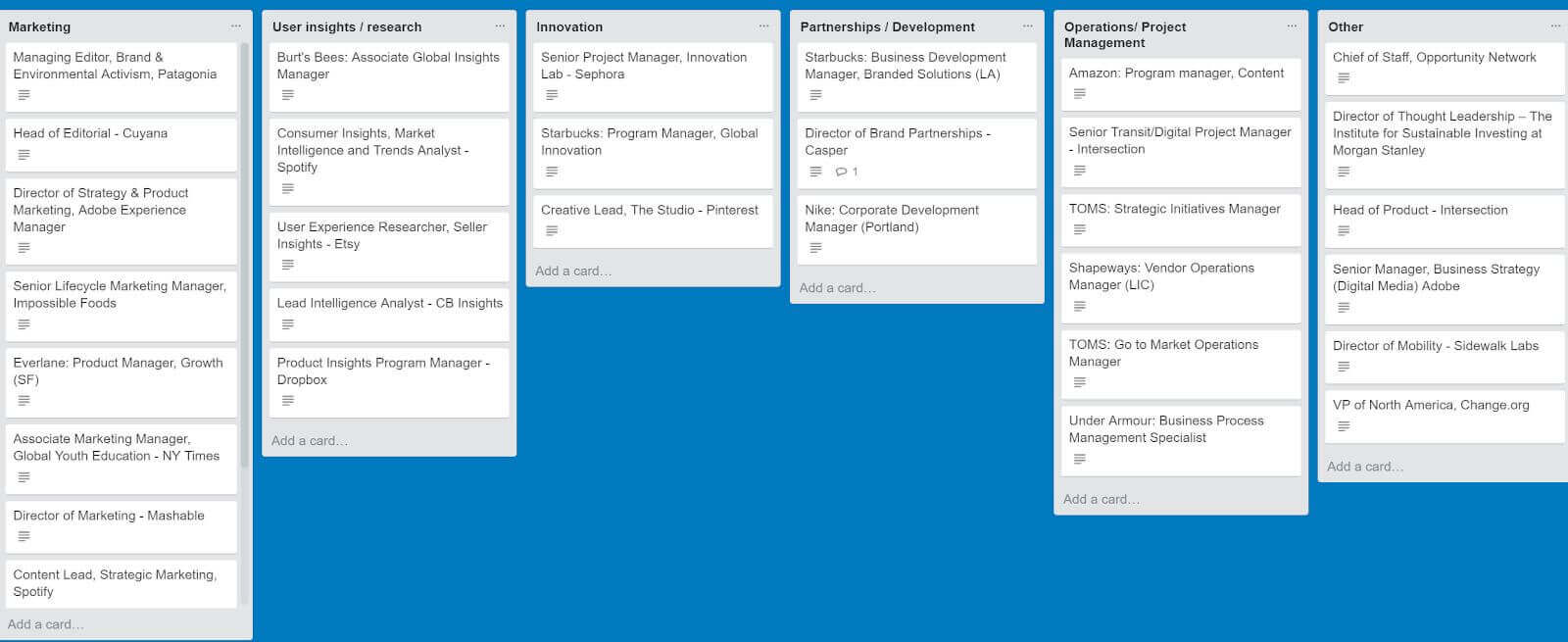
Now, deep dive into the most interesting lists for job keywords and use those keywords to set up job alerts. Setting up job alerts will save you so much time. You’ll be automatically notified as soon as jobs are listed so you can be one of the first people to apply. Alerts also let you passively keep tabs on the sorts of jobs companies are hiring for most, which will help you stay informed about the top and trending skills on company wish lists.
Go to Google Job Alerts and set up as many alerts as you want based on the keywords that appear in your most desired jobs. For me, based on my lists above, these were:
- Product Marketing
- Innovation
- User Insights
If you are looking for jobs in a specific location, add that to your search.
The keywords you select in this process can also help inform the way you pitch yourself or describe your interests to people. For example, I started my bio with “Hilary works at the intersection of marketing strategy, customer insights, and innovation,” and learned to frame my professional accomplishments in ways that spoke to these interests.
3) Upgrade Your Resume
I’m not going to go too deep into this, but your resume or CV is obviously an important part of getting your dream job. I hear people complain all the time that their resume is not impressive enough and that there’s nothing they can do about it. But—I promise you this is true—you can make any resume look impressive if you learn how to make it ~sing~. Here are two must-haves for your new and improved resume:
- Make the bullet points about accomplishments, rather than a list of responsibilities.
- Include as many accomplishments in numbers as possible to illustrate the scope and impact of your projects.
Here is some great reading about how to do this:
- Resume Revamp: How to Turn Your Duties Into Accomplishments
- How to Quantify Your Resume Bullets (When You Don’t Work With Numbers)
- 185 Powerful Verbs that will Make Your Resume Awesome
Some other tips for understanding how to market yourself include:
- Use this excellent personal brand workbook from PwC to translate your strengths and passions into a compelling narrative that will help you stand out.
- Ask coworkers and friends for specific feedback about your strengths, why they like working with you, and what they think makes you unique.
- Look at the LinkedIn profiles for people who hold or held similar jobs to you. How do they position their accomplishments? Ask to see their resumes if you can.
4) Get The Experience Now
Now you have a better idea of what kinds of jobs you’re most interested in. But what if you don’t yet have the experience they’re looking for? You’ll be competing against many other well-qualified job seekers. Beating them will be hard. So don’t try to beat them—instead, spend a couple months pitching relevant projects to people who are probably not hearing from hundreds of applicants. Freelance and contractor work is a great way to become the kind of person your dream employers will want to hire.
You can successfully pitch a freelance project by doing research into a company’s pain points and then being authentic about how you can contribute to solving them. The scrappier you get with the research, the more impressed potential employers will be.
First, create a new Trello list called “Companies to pitch.” Add companies from your original list and also ones you come across during job research, so long as they have one additional key qualifier: You can realistically get somebody there to pay attention to your email.
You might have a friend who works there, or a friend of a friend, or perhaps the company is just small enough that you can pretty easily find contact information for the right person. Make new cards for each company, and as you do research and identify contacts, add all relevant information to the card. It will look something like this:
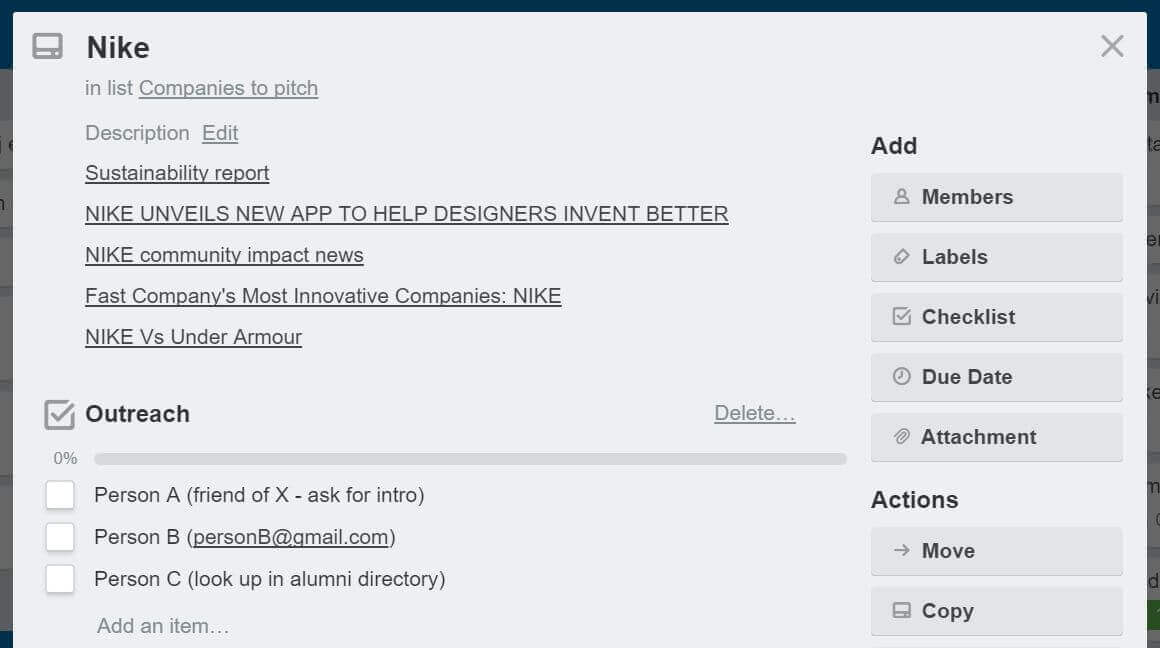
Here are some ways to do research:
- Read the company’s website, annual reports, and recent press releases.
- Talk to friends (or friends of friends) who work in your target companies, industries and functions. Ask them, “What are companies who are succeeding in this industry doing well?” “What are common mistakes companies in this industry are making?”
- Look at open positions to see what skills they are looking for.
- Look at competitors’ open positions. (This is important: If the leader in the space looks like it’s building out its mobile commerce strategy, then its competitors will soon be doing that too.)
- Read news about the company and their competitors on Fast Company, Forbes, and other business media.
- Google things like “[industry] challenges” or “[industry] trends” or “[industry] [function] best practices” to get a sense of where resources are going.
- Look at your newly-updated resume. What projects do you think you could help them with based on your experience alone?
- Think about the company’s target demographic and try to talk with customers about why they have (or have not) bought things from the company. This is especially impressive for a pitch if the company is B2B and you can hunt someone down who fits a professional demographic.
- Subscribe to relevant industry newsletters. Here are some good ones:
- CB Insights
- Stratechery (newsletter is $10/month)
- Finimize
- Industry Dive (choose from 13 verticals)
- Google “[industry you’re interested in] industry newsletter”
Next, you’ll want to identify contacts at these companies. Whether you aim to get on the phone with someone before or after you’ve put together concrete project ideas depends on your relationship with the person and where you are in the process. Regardless, when you find a connection, add them to the company Trello card. (You might also want to track your networking on a separate board: Here’s how I set up my job networking board.)
Beyond friends, how do you realistically find contacts?
- LinkedIn: Search for the company and comb through any first or second degree connections you have there.
- University networks: Sign up for your alumni directory and search there. You can also do this on LinkedIn by cross-searching for the company and your school. I was shocked at how helpful people were just because we went to the same school for undergrad.
- Scrappy company contacts: Be careful with this one because you don’t want to seem aggressive or spammy. If it’s a small company, you can usually find someone to reach out to. When I wanted to find a contact at the e-commerce company Cuyana, I called up their customer service hotline and asked for an email address where I could send a pitch for an internship project.
Pro Tip: Sometimes you just have to guess someone’s email address. Put it into https://email-checker.net/check to find out if the email address is valid before you start sending messages out into the abyss.
So, now you’ve done the research and you have your list of contacts. Time to get in touch.
Asking for an introduction
If you want a friend to introduce you to someone in their network, you need to do 99% of the work for them. That means sending two emails: one where you ask if they’ll connect you, and another for them to forward you along to their contact. Don’t expect them to pitch you on your behalf—that’s asking for a lot of effort, and they probably won’t do it as well as you can!
Again, whether you want to start by getting to know the person and asking questions about the team, versus going right into the pitch, totally depends on the person. If I have enough of a personal connection that I think the person will be happy to talk on the phone with me for 20 minutes, I’ll usually start with that so that we can get to know each other and then use the follow up/thank you email to pitch. Otherwise, I’ll go right into the pitch.
Here is a generic set of introduction emails to use as a guideline:
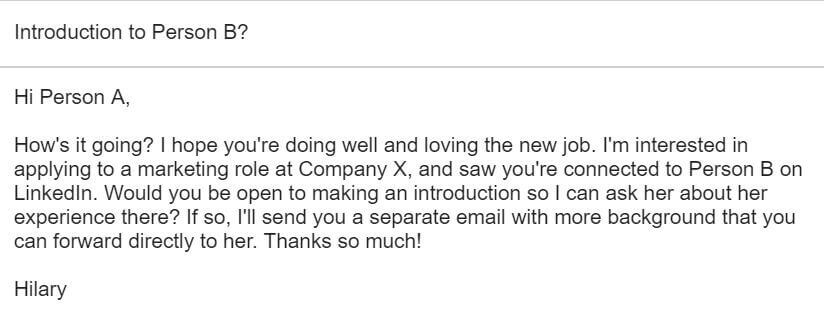
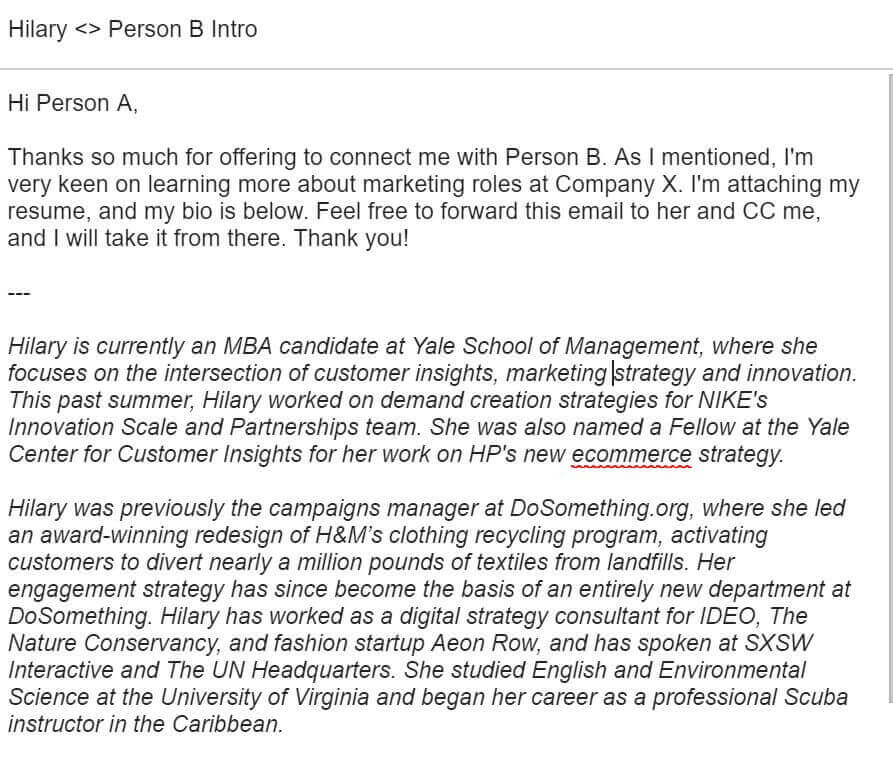
Warm pitch
Here’s the pitch I sent to Squarespace, which a friend of mine who worked there offered to pass along.
Cold pitch
Here’s the pitch I sent to Cuyana, after getting an email address from calling their customer service number.
Follow-up pitch
My project at NIKE started with a general informational interview, during which I brought up the possibility of doing some work there over the summer. The woman I spoke with sounded interested, so a few days after our conversation, I followed up with this simple pitch.
Thank you
You should always send a thank you note after any conversation you have related to jobs:
- Keep it short.
- Show them you learned something from the call.
- Move the conversation forward. In this case, by reiterating your ideas for projects you could work on with the company, and asking what next steps would be.
Read along to the interview section for some actual examples of thank you notes I’ve sent.
Hopefully, you’ll start to get some traction and will begin working on projects that you can add to your resume. If you’re not having any luck at your top companies, or if payment terms are getting in the way, start trying to find very early stage startups and offer to work for free, if you can. They always need the help.
While you’re at it, turn your interests into projects that have results: write a blog, organize an event, bring people together, whatever. It makes you look good in interviews if you can say “I love music, so I started writing for this publication / set up this event” as opposed to “I love music, so I go to a lot of concerts.”
5) Get The Job Of Your Dreams
Congratulations! You are now the person that companies want to hire for your dream role. Even better, you have a new set of contacts in the industry. Maybe you proved yourself so indispensable during your freelance project that they want to bring you on full-time. Or maybe it’s time for you to finally look for jobs with the aim of applying to them.
You already set job alerts up. Now you just need to start tracking the networking and application process. Return to your Trello board and start a new list called “Open jobs.” Add jobs you find through job alerts, through looking up job boards at your target companies, and through searching Google Jobs.
Networking
Again, do your best to find contacts at the organizations you want to apply to. Track your correspondence on a networking Trello board. Use the same processes outlined above, except now you’re asking for a referral. Here’s a slightly tweaked version of the same generic introduction ask:
Email 1:
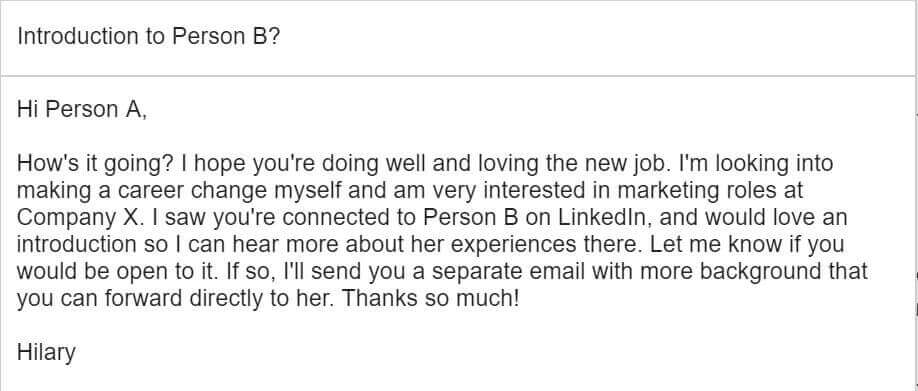
Email 2:
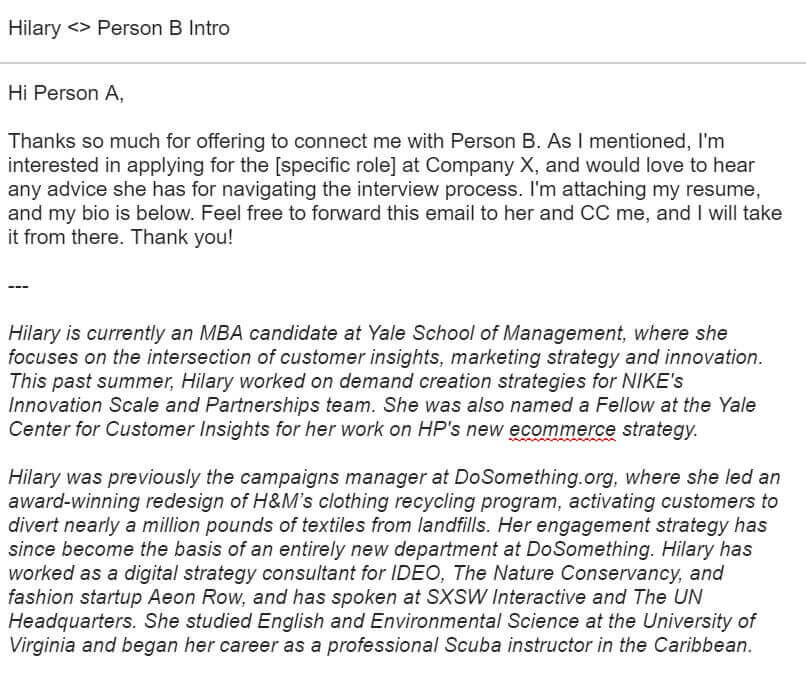
This is also a great excuse to reach out to people you spoke with earlier in the process and update them on some of the interesting work you’ve been doing.
Add contacts to the “No Contact Yet” board, then move them along as you move through the process. Add notes from your conversation right in the card so you can find it easily. If someone sits in the “Reached out to” list for a week without you hearing back from them, politely follow up. If another week goes by and you still don’t hear anything, move them to the Networking Graveyard.
Interview
Your chances of getting an interview go way, way up once you’ve gotten someone inside the company to refer you. Going into an interview, you should be prepared to answer (and ask!) questions across three dimensions:
- The Company and Industry
- If you need help organizing this information, use the SWOT (company) or Porter’s Five Forces (industry) frameworks.
- If you do the research I outlined above you’ll be fine here. You should be prepared to talk about the company strategy, how it stacks up against competitors, how you stay on top of trends, etc
- The Function
- Thinking through the specific role: What are the strengths and weaknesses of the company’s [output of the team you’re applying to]? What peer companies are doing [that team’s job] well? What would you do differently? What are the unique challenges the team faces, given what you know about the company?
- Yourself
- These are the “common interview questions.” Here’s a good guide for answering them.
- Familiarize yourself with the STAR (Situation, Task, Action, Response) framework to help you structure your interview answers. Don’t get caught rambling or missing key points!
Thank you
Thank you notes should be short and show you learned something from the conversation. Additionally, a post-interview thank you note should:
- Reiterate that you understand the team/company goals and are uniquely qualified to achieve them.
- Show your excitement about the position.
Here’s an example from my second round interview at Dropbox. You’ll notice how I gave myself an action item to follow up on (and then did follow up) in the email.
Job Search Success!
Throughout the process, make sure you continue thinking critically about what kinds of things will make you happy, versus what other people tell you that you should want. In my mind, a job should do at least one of the following things:
- Let you work on problems you find genuinely interesting and important
- Set you up for a job that will let you do those things
- Pay you well
If it does all three, you’ve hit the jackpot! If it does zero, get out ASAP.
My career has taken many twists and turns—from teaching scuba diving to environmental advocacy to an amazing job at Dropbox. Your skills can transfer and open doors by simply reframing your accomplishments and speaking the language of hiring managers. For those qualifications you don’t have, think outside the box and work on projects that will turn you into a must-have hire.
It’s never too late to change course and find a job that aligns with your values, passions, and needs. Once you truly believe in the value you can bring to an organization, it’s just a matter of time before you convince the right person and land your perfect job.
Next: Using Trello For A Job Search: Less Stress, More Process







































